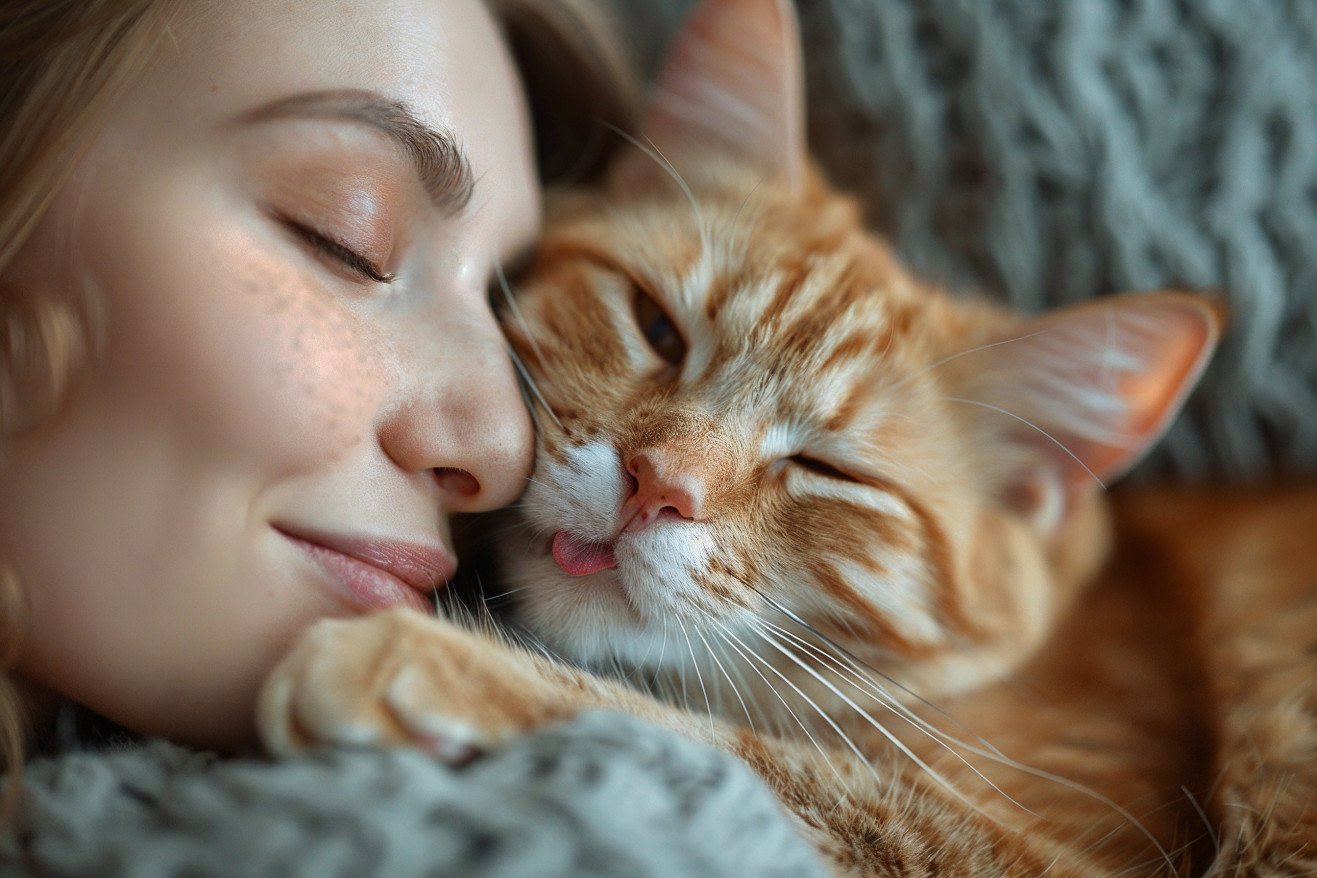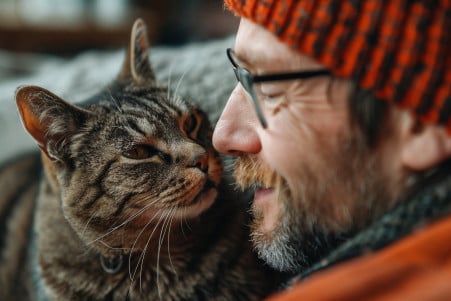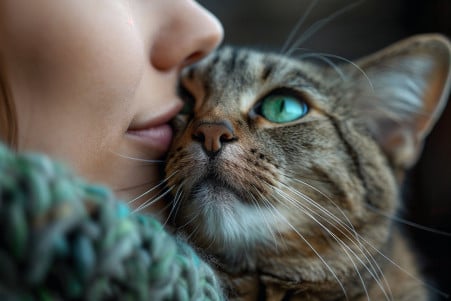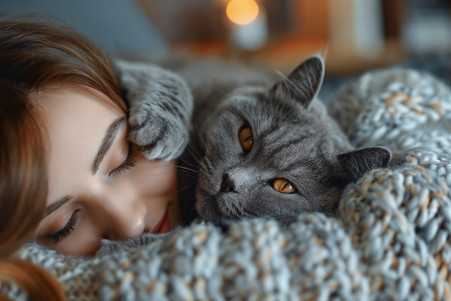Why Does My Cat Lick My Nose? Decoding Feline Affection
3 March 2024 • Updated 2 March 2024

It may feel like your cat’s habit of licking your nose is entirely arbitrary, but there’s more to it than you might think. Your cat licks your nose as a sign of affection, similar to how it grooms itself or its kin. Cats also lick to mark their territory with scent, seek attention, or express comfort. Excessive licking, on the other hand, can be a sign of stress or an underlying medical condition.
This article will delve into the many nuances of feline behavior, using insights from veterinarians, animal behaviorists, and ethologists. Through this investigation, you’ll learn about the many reasons your cat licks your nose, from affection and communication to health concerns. By learning about this behavior from a scientific perspective, you’ll not only gain knowledge but also strengthen the special relationship you have with your furry friend.
Why does my cat lick my nose?
The Psychology of Cat Licks
While cats typically only allogroom other cats they are close to, they also extend this behavior to humans. So when a cat licks your nose, it is a sign of affection and trust.
This grooming behavior is an intimate form of social bonding, indicating that you are part of their family. As a study in PMC by Dennis C. Turner explains, cats use these social behaviors to show friendliness, which then impacts the human’s attachment to the cat.
The emotional and psychological dynamics of cat-human relationships are complex and deeply rooted. As a study in ScienceDirect by Kristyn R. Vitale explains, cats have been shown to have attachment styles with their human caregivers that are similar to the secure and insecure attachments of human infants. This research supports the idea that cats are social animals that can form strong bonds with their human companions.
When a cat licks your nose, it’s not just about being close to you; it’s about attachment and security. These behaviors show a level of mutual understanding and emotional connection between you and your cat. But beyond the physical act of licking, we can also look at how their sense of taste and smell play a role in these behaviors.
The Science Behind Cats’ Taste Buds and Noses
Cats’ sense of taste and smell is highly advanced and plays a major role in how they experience the world. According to Neuroscience News, a cat’s nasal cavity divides the air it breathes in into two parts, one for breathing and the other for olfaction.
A study in PLOS Computational Biology found that this division, which works like a gas chromatograph, is more than 100 times more efficient at detecting smells than a simple nasal cavity.
A mutation that makes cats less sensitive to sweet tastes is explained by PMC, but cats still have a number of working bitter taste receptors. These receptors aren’t affected by the fact that cats are obligate carnivores, like the sweet receptors, which suggests they have other purposes beyond detecting toxic compounds in plants.
The cat’s instinct to lick to explore and identify things in their environment may be related to their ability to detect bitterness.
Cats’ highly developed sense of smell and taste isn’t just about being picky eaters, it’s also about survival. As we learn more about the science behind these super senses, we can see how cats’ taste and smell preferences are linked to their behaviors, including the sometimes perplexing and adorable behavior of licking their owner’s nose. This complex sensory system impacts what cats eat, how they communicate, and how they mark their territory.
The Scent of Belonging: How Cats Mark Their Humans
Scent marking is a fundamental aspect of feline behavior, and cats use it to let other animals know they are there and to define their territory. TexVetPets notes that cats have scent glands all over their bodies, including on their cheeks and between their toes, and they use these glands to rub their scent onto objects or people.
This kind of olfactory marking isn’t just about territory, it also helps cats identify members of their social group.
Pheromones, which are chemicals that are secreted by these glands, contain information about an individual cat and are important for both territorial marking and social interactions between cats. When cats lick their owners, they may be transferring pheromones through their saliva, which can help mark their human as part of their ‘colony’.
While this behavior starts as a way to show affection and to explore the world through their senses, it is also rooted in the instinctual need to mark territory. Understanding this can help us comprehend the complex ways that our cats demonstrate their attachment to us that go beyond snuggles and purrs, and remind us of our significant place in their world.
Medical and Emotional Causes of Cat Licking
While your cat may be licking your nose to show you some love, there may be other reasons behind this behavior. According to PetMD, your cat may be licking you because of medical issues or anxiety.
In general, cats lick to relieve stress, and they do so by reverting to a behavior that they used to comfort themselves as kittens. This self-soothing behavior can help them take their minds off of whatever is bothering them.
That said, if your cat is licking you too much, it could be a sign of a problem. According to BeChewy, if your cat is licking you and is also experiencing changes in their behavior or appetite, it could be a sign that they’re dealing with an underlying medical issue, such as pain, skin conditions, or allergies. In this case, it’s clear that you should seek help from a vet.
In addition to medical issues, constant or intense licking could be a sign of an emotional problem. According to Rover, the Cornell Feline Health Center says that stress or anxiety could be causing your cat to lick you. This stress or anxiety could be caused by changes in the environment, the loss of a companion, or other issues.
If you’re a loving cat owner and you notice that your cat is licking you more often and more intensely than usual, it’s time to take them to the vet. They can help you determine whether your cat’s licking is a harmless soothing behavior or a sign of an underlying issue.
After all, you want to make sure that your cat is healthy and happy so that you can enjoy a long and fulfilling life with your furry friend.
How to Deal With Your Cat’s Licking: Tips and Boundaries
One of the most effective ways to manage and gently redirect your cat’s licking is to provide alternative stimulation. Cats Protection suggests that playing with your cat using a range of interactive toys can be a great way to distract it from licking. This kind of environmental enrichment can help reduce stress, which in turn can help reduce stress-related licking.
Positive reinforcement is important: make sure you give your cat treats or praise when it does something you want it to do so that it will be more likely to do it again.
Let your cat know that you like what it’s doing by petting it or giving it its favorite toy when it licks less or does something else. Purina notes that it’s important to use treats in moderation in order to keep your cat healthy.
It’s important to respect your cat’s natural instincts while also making sure that you both feel comfortable. Cats Protection warns that punishing your cat for licking can lead to stress and other problem behaviors. Instead, make sure that you’re listening to your cat’s needs and gently guiding its behavior so that you can both enjoy a happy relationship and a stronger bond that benefits you both.
The Language of Licks: What Your Cat’s Kisses Mean
In learning about the many reasons why cats lick their owners’ noses, we can see that this behavior is more than just a quirk, but a complex pattern of love, communication, and instinct.
From the social bonds of allogrooming to the way cats use taste and smell to learn about and identify the world around them, your cat’s licks are a rich form of expression. Even the territorial nature of scent marking, and the potential impact of health and stress, show that there’s a lot more to each loving lick than meets the eye.
Yet, knowing this isn’t just about understanding the ins and outs of cat behavior, it’s about deepening the relationship you have with your pet. By recognizing the many ways that cats show their love and the many things that are going on when they do, we can better understand and meet our cats’ needs and feelings.
So the next time your cat licks your nose, think about the many layers of love and life that go into that simple act. And treasure it, because it’s your cat’s way of telling you that you are loved, that you are family, and that you are known.


